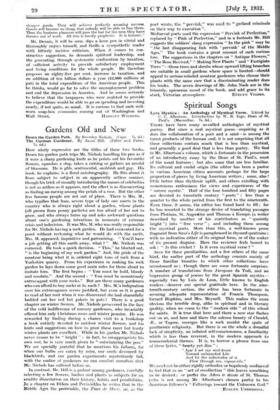Gardens Old and New
How nicely expressive are the titles of these two books. Down his garden path trips Mr. Nichols handling his pen as if it were is sharp gardening knife as he points out his favourite flowers, squashes a slug, takes a cutting or gathers an armful of blossoms. He is glib, sentimental, snobbish and gay. His book, he explains, is a floral autobiography. He flits about it from subject to subject in an apparently artless manner, though his trick of casually introducing the names of celebrities is not as artless as it appears, and the effect is as disconcerting as finding an earwig among the petals of a rose. But the other less famous people are not out of place. There is Mrs. M., who typifies that lean, severe type of lady one meets in the country who is always right about a garden, whose plants (all grown from penny packets) are too afraid of her not to grow, and who always turns up and asks awkward questions about one's gardening intentions in moments of extreme crisis and indecision. It was Mrs. M. who was really responsible for Mr. Nichols having a rock garden. He had excavated for a _ pond without reckoning what he would do with the earth. Mrs. M. appeared, inquisitive and patronizing. "You'll have a job getting all this earth away, what ? " Mr. Nichols was cornered. He took a quick decision. " This," he blurted out, "is the beginning of my rock garden." And, the pride of the amateur being what it is, ordered eight tons of rock from a Yorkshire quarry. From his experience in Making his rock garden he lays down some good main rules for those about to imitate him. The first begins : "You must be bold, bloody and resolute." And the second : "You must be monstrously extravagant with your rocks." But are there many gardeners who can afford to buy rocks at 5s. each ? Mrs. M.'s indignation over his extravagance seems justified, but even so it is good to read of her rout when it was discovered she had shamefully bedded out her red -hot pokers in pots ! There is a good chapter on winter flowers. Mr. Nichols persevered in the 'face of the cold indifference of nursery gardeners, who invariably offered him only Christmas roses and winter jasmine. He was rewarded by finding during a chance visit to a bookshop a book entirely devoted to outdoor winter flowers, and his hints and suggestions on how to grow these rarer but hardy winter plants are excellent. While in his garden Mr. Nichols never ceases to he "bright" : in fact, to misappropriate his own mot, he is very much given to " outwinnying the poo." We are specially grateful that he mentions his failures, for when our bulbs are eaten by mice, our seeds devoured by blackbirds, and our garden experiments mysteriously fail, with the malice of gardeners we can comfort ourselves that Mr. Nichols has suffered before us.
In contrast, Mr. Hill is a pedant among gardeners, carefully 'selecting a few flowers, bushes and plants -as subjects for an erudite dissertation on their history, habits and possibilities. )n a chapter on Elders and Periwinkles hc writes that in the Middle Ages the periwinkle, the More de Merle, or, US the
poet wrote, the " pervink," was used to "garland criminals on their way to execution ". Mediaeval poets used the expression " Pervink of Perfection," replaced by "Pink of Perfection," and in a footnote Mr. Hill suggests the soldiers' slang expression "In the pink" may be the last disappearing link with pervink' of the Middle Ages." The book contains a great amount of such curious lore. The suggestions in the chapters on "Antique Flowers," "The Rose Revived," "Making New Plants " and" Fastigiate Trees "—those trees and shrubs whose upward lifting branches are suitable in small gardens where space is limited—should appeal to serious-minded amateur gardeners who choose their plants with the same care that a discriminating reader does his books. The seven drawings of Mr. John Nash are in the leisurely, epicurean mood of the boOk, and add grace to its






































 Previous page
Previous page